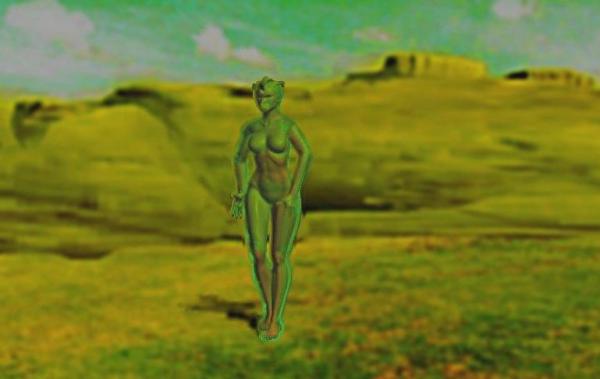BY LETTER
Envirosuit
Culture and Society > Daily Life > Clothing
Technology > Application > Envirotech
Technology > Application > Everydaytech
Technology > Technology Type or Material > Syntech/Synanotech
Technology > Application > Envirotech
Technology > Application > Everydaytech
Technology > Technology Type or Material > Syntech/Synanotech
 Image from Julia Harrison |
Envirosuit is a general name for any of a variety of advanced 'living', form-fitting synanotech devices that allow the wearer to move freely and interact as if in er home environment in surroundings that might otherwise be uncomfortable or even fatal.
The suit provides physical protection and support, a suitable internal pressure and temperature, and an appropriate mix of gases or liquids to its inhabitant. Most envirosuits also translate sensory information from the external environment if required, enhancing reducing or altering sound and light, touch and temperature, and even in some cases producing analogues of smells and tastes that would otherwise be imperceptible or fatal to the suit's user. These translation devices can be hazardous if the user is lulled into treating a hazardous external environment as if it were actually habitable and safe.
A typical envirosuit is no more than a centimetre thick across the main body and thinner along extremities, with a swelling (typically in a backpack in models for humans) that contains a power supply plus computronium sufficient to support a sentient but subturingrade ai. Onboard nano allows a standard envirosuit a degree of self maintenance and self repair. Most envirosuits are made to support a particular clade in a single set of similar environments. For instance, an envirosuit may be made for human bionts on a typical Mars-like world, or for dolphin provolves who intend to swim in an ammonia water ocean, for To'ul'hs or cryovecs who wish to travel in a standard Terragen hab. There are some more versatile models, but like those that need to mediate the more extreme environmental differences these tend to be relatively bulky.
A few envirosuits have been built with sophont-grade ai and are neumann-capable (able to reproduce their own form), and some of these have gone on to form clades of their own.
 Image from Steve Bowers | |
| Envirosuit in use in the chlorine-rich atmosphere of Chorus | |
Related Articles
Appears in Topics
Development Notes
Text by Stephen Inniss
Initially published on 12 October 2009.
Initially published on 12 October 2009.






